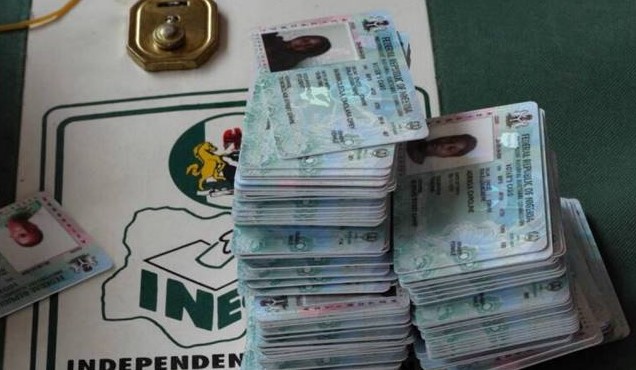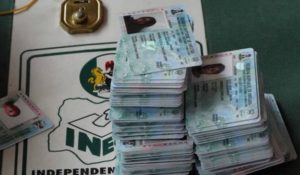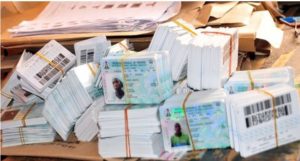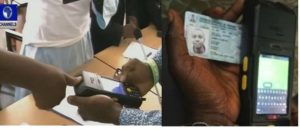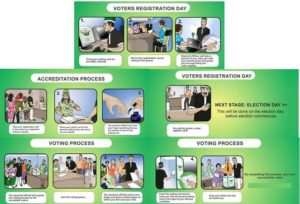In a couple of days, Nigerians re-scheduled elections will hold. More than ever before, ICT has been integrated into the electoral process. Just how much impact this would have on transparent voting is the kernel of this report by KnowHow Media International, publisher of IT Edge News. MARTIN EKPEKE.
Even though it has been argued that technology cannot replace a lack of trust in the framework of a country’s electoral process, or by itself build that trust, it has also been noticed in the past decade that election management bodies globally have increasingly relied on ICTs to improve the accuracy, security and integrity of their electoral processes.
Much of this is seen with regards to voter registration, results management and the recent talk about electronic voting. Appropriately introduced, technology can add major benefits to an electoral process. The use of ICT, including social media has opened up additional avenues of assisting in the conduct of free, fair and credible elections.
Supporters believe technology can solve most elections-related problems, but critics believe it can dilute the core essence of democracy. So the challenge is to find an answer that lies in between—one that aims to apply appropriate technology to promote free, fair and credible elections.
In 2011, much of technology was deployed by the Independent National Electoral Commission (INEC) in conducting the election. For the first time in the history of Nigeria election, INEC modernised its information technology infrastructure by migrating from an out-dated legacy voting system heavily dependent on inaccurate paper records and polling cards to the newer Electronic Voting System (EVS). A system that captures all the names of all eligible voters, eliminates duplication and minimizes discrepancies in the electoral process.
The outcome of that election was applauded by Nigerians, including international election observers and monitors, saying the election was free and fair. These open up more opportunities for the Commission to build upon and become a very effective and reliable election management body. It has got the public goodwill. The use of ICT and partnership with other agencies can be built upon.
And here now cometh, the 2015 elections
The voter register presented by the INEC for the 2015 general elections as mandated by the Electoral Act contains 68.8million electorates who will decide the fate of nominated candidates contesting for the Presidency and National Assembly in the March general election.
This year election has 14 candidates duly nominated by political parties for one presidential seat, 739 candidates for 109 senatorial seats while the House of Representative election has 1,780 candidates contesting for 360 seats.
At the presidential level, Dr. Goodluck Jonathan, the incumbent president, representing the People Democratic Party will be facing a retired Army General, Muhammadu Buhari of the All Progressive Congress.
Pundits believe the election will be highly contested, and so the stakes are high. Expectations from the election umpire are high too, with the hope that INEC will come clean at the end of the day with an election that will be seen to be fair and free.
Technology to the rescue
Just like a number of other developing countries, the INEC had long before the 2015 election promised to improve on the use of ICT tools, saying the capacity of staff will be built on the deployment and utilization of ICT.
The election umpire also revealed that there is highly improved IT infrastructure such as the biometric national register of voters and the use of zonal stores to improve logistics by. But pessimists believe that INEC needs to do more. To these critics, the lack of a database of trained ad-hoc staff nationwide and over-centralisation of planning at the Commission’s headquarters is worrisome.
To begin, a GIS expert, Mr. Ireti Ajala said INEC needs to spatially locate the agency’s 119,973 polling locations scattered around the country. He added that these locations and their attributes needed to be linked to the Election Voters’ Register through GIS technology.
“With GIS, Geo-Imaging proposed integrating GPS, digital photography, and DBMS technologies to create a data collection tool capable of capturing the locations and images of existing polling units can be ensured,” said Ajala.
Trends elsewhere
All over the world, electoral umpires have sought to improve how they deliver on transparent elections using ICT tools. Most electoral management bodies around the world use new technologies ranging from basic office automation tools such as word processing and spreadsheets to more sophisticated data processing tools, such as database management systems, optical scanning and geographic information systems with the aim of improving the electoral process.
These technologies open up new frontiers and offer new possibilities for the electoral process, especially for voting operations, in order to foreclose any unforeseen risks such as an increase in vote selling or difficulty in auditing election results.
One of the technologies the Independent National Electoral Commission (INEC) is relying on to deter electoral fraud is an electronic reader for voter registration cards. The chairman of INEC, Prof. Attahiru Jega unveiled the technology few months ago in the presence of local election monitoring and advocacy groups. Jega said collaboration between civil society and the government is key in ensuring that voters are educated on the new technology.
“Card readers are new to Nigeria. Education will be key to the success of the technology, ensuring that voters are prepared to properly cast their ballots, and observer groups can monitor the machines’ use and ensure that election day procedures adhere to the electoral code,” said Jega.
Despite the controversies stirred by some political parties over the reliability of the card readers, the electoral umpire has maintained that it will use the card readers. A test run of the system was carried out recently in a mock voting exercise and after it, though there were minor hitches, the INEC ruled that it will use the card readers.
The technology will read voter cards that contain a photograph, thumbprint and other biometric data that will allow polling officials to verify that a voter is who he or she claims to be and has voted only once. The cards are designed to prevent theft, transfer or illegal card production to reduce the risk of double voting and other forms of fraud.
But Warri based Ayo Matogu said he is not carried away with the card reader technology. Warri is hub of commercial activities in south of the River Niger in Nigeria. Matogu said, though card reader is an innovative move by INEC which can possibly erase election frauds, he believes the system ought to have been used for previous election to access its workability. “I am not aware whether the technology has been tested in any of the previous election, what if it fails?” He asked.
Can e-voting work in Nigeria?
All over the world, what drives election management bodies to adopt electronic voting and counting technologies include, but not limited to assumed reduction of polling fraud, faster results tabulation and availability, reduction in the number of spoiled votes, more convenient for voters and greater accessibility, which leads to greater participation.
Countries like Germany, Ireland, India and the Netherlands have tested e-voting at one point, but for varying reasons returned to manual voting. No doubt, the benefits of e-voting outweigh the drawback, but how will a country like Nigeria with limited infrastructure present some comparative advantage?
The Nigerian ICT space is still grappling with a lack of infrastructure to drive e-voting, especially in the rural areas. Understanding of how e-voting system works will be a challenge as many people do not have first-hand experience of ICT tools. In a country of over 180 million people, just about 68 million have access to the internet; meaning with e-voting, 70 per cent of Nigerians will be disenfranchised.
Sample of an electronic voting machine in India
How prepare is INEC with identity theft?
As election management bodies look to technology and considering the use of biometric data to address challenges of detecting multiple registrants, it is appropriate to consider some of the issues that are emerging between technology and identity.
Data protection is a global imperative and should be given effect through appropriate laws and regulations, but Nigeria is yet to sign into law the Cybercrime bill that is said to have been passed by the Senate.
A Lagos based lawyer, Friday Efetie sees this as a challenge. He asked how INEC will be able to protect the bulk of individual’s information at their disposal. “Normally, governments are generally the primary issuers of the most trustworthy credentials for individuals’ identity like passports and biometric national ID, but in this age and time when data mining, biometrics, digital eavesdropping are on the rise, where does INEC leaves the potential voter identity secured,” he expressed concerns.
He added that INEC must be clear on whose data is collected, what precisely is collected, what purpose the data will be used for, how long the data will be retained, who has access to the data, who can alter the data and what rights individuals have with respect to the data collected from them.
In countries like Nigeria that lacks the necessary legislative framework relating to data protection, privacy and transparency, but are pioneering digital registration, INEC in this case may have to be a leader on such policy matter.
The mobile phone is playing a role
It has been reported that INEC is considering providing emergency telephone lines at all the 119,973 polling units in the country during the general elections. Many people doubt this though, saying the Commission may not have the capacity.
With the belief that no election could be conducted in the country without incidents of misbehaviours by miscreants, who would try to defend their political party’s or master’s interest, INEC said the telephones would be used by the electorate in channelling their complaints to the commission during elections.
“To ensure free, fair and credible elections, we have already enlightened people via radio and television jingles and we are still ready to make telephone numbers available for questions regarding election process and procedures,” Alhaji Abubakar Wara, Resident Electoral Commissioner for Zamfara State said in a meeting with civil society organisations and persons with disability in Gusau.
Internet, Social Media to play a key role
As of today, all the political parties in Nigeria, including the PDP and APC, the two major opposing parties have reasoned that the Internet and the social media is key to the advancement of their ambition.
APC for instance, has over 90,000 followers on Twitter and a large pool of friends on Facebook and other social media platforms. A more Internet conservative PDP on the other hand has over 40,000 followers on Twitter and a large pool of friends on Facebook and other social media platforms, just like the APC.
A social media enthusiast, Mr. Dele Alade once said if the social media were to be to criteria to win elections, the PDP would have long kissed the exercise, goodbye. He believes the APC has a much more solid presence online than the PDP. “The PDP is merely gasping online in their campaign while the APC is smoking hot,” he added.
What this means, is that the rapid pace of technological development in the area of communications is one of the major drivers of the contemporary election processes, bringing efficiency in the dissemination of information as it happens.
GSM communication and the internet have made election observation easier, as shown in some past elections conducted by INEC. The mobile phone’s recordings of electoral processes and results have been made and disseminated to international audiences as they were happening. Media chats on mobile phones and laptops can be the basis of running commentaries on elections as they are being held. The great strength of these is that they enable people to put their observations out there in the international public domain and invite instantaneous reactions from a broad audience.
The knowledge that election malpractices are being observed and these observations are being disseminated to a wide international audience can serve as a deterrent to those who plan to participate in such malpractices. This can also draw the attention of relevant electoral authorities and security agencies to the points where their immediate intervention is required.
The merit in the development of social media for free, fair and open elections is so high that what ought to be done is to explore them as evidence when electoral matters go to court, but for the Cybercrime law. It is certainly the case that as the mobile phone and internet culture deepens in Nigeria, the ability for multiple audience interaction internationally on election day matters will also increase.
Brief on Nigeria
Nigeria is a federal constitutional republic comprising 36 states and its Federal Capital Territory, Abuja. Nigeria is located in West Africa and shares land borders with the Republic of Benin in the west, Chad and Cameroon in the east, and Niger in the north. Its coast in the south lies on the Gulf of Guinea in the Atlantic Ocean.
Nigeria is often referred to as the “Giant of Africa”, owing to its large population and economy. With approximately 180 million inhabitants, Nigeria is the most populous country in Africa and the seventh most populous country in the world. Nigeria has one of the largest populations of youth in the world. The country is inhabited by over 500 ethnic groups, of which the three largest are the Hausa, Igbo and Yoruba.
Brief on INEC
The Independent National Electoral Commission (INEC) is a nonpartisan Nigerian government agency charged with the conduct and supervision of elections. The Commission was established in accordance with Section 153(f) of the Constitution of the Federal Republic of Nigeria. It is made up of a Chairman, and 12 National Commissioners.
The functions of the Commission as stipulated in Part I of the Third Schedule to the 1999 Constitution are as listed below:
- Organize, undertake and supervise all elections to the offices of the President and Vice-president, the Governor and Deputy Governor of a state, and to the membership of the Senate, the House of Representatives and the House of Assembly of each State of the Federation.
- Register political parties in accordance with the provisions of this Constitution and an act of the National Assembly.
- Monitor the organization and operation of the political parties, including their finances.
- Arrange for the annual examination and auditing of the funds and accounts of political parties, and publish a report on such examination and audit for public information.
- Arrange and conduct the registration of persons qualified to vote as well as prepare, maintain and revise the register of voters for the purpose of any election under this Constitution.
- Monitors political campaigns and provide rules and regulations, which shall govern the political parties.
- Ensure that all Electoral Commissioners, Electoral and Returning officers take and subscribe to the oath of office prescribed by law.
- Delegate any of its powers to any Resident Electoral Commissioners.
- Carry out such other functions as may be conferred upon it by an Act of the National Assembly.
Historical review of Electoral Commissions in Nigeria
The first election held in Nigeria was into the legislative Councils in Lagos and Calabar in 1922 in line with the Clifford Constitution. The elections during the colonial period were organized by the colonial government. But as from the 1959 elections, election management bodies were set up to conduct elections in Nigeria. In 1959, the Electoral Commission of Nigeria (ECN) was set up to conduct elections in the Country. The ECN conducted the 1959 general elections. In 1964, another Federal Electoral Commission was set up to conduct the December 1964 federal elections and the 1965Western regional elections. On 15th January, 1966, the first military coup de’tat took place and the military ruled from 1966-1979. The 1979 Constitution of the Federal Republic of Nigeria established the Federal Electoral Commission (FEDECO) which organized the 1979 and 1983 general elections. In 1987, the Babangida regime established the National Electoral Commission (NEC) which organized elections in 1992-1993 and finally the June 12, 1993 elections which was adjudged to be free and fair but was annulled by the regime. In December 1995, General Sani Abacha established National Electoral Commission of Nigeria (NECON).The 1999 Constitution established the Independent National Electoral Commission (INEC).
Steps to voting in 2015
Step 1: A Nigerian citizen who is eligible to vote, goes to the INEC website to locate his Polling Unit.
Step 2: The citizen goes to the chosen Polling Unit to register
Step 3: The citizen would have his/her picture taken and his/her details captured.
Step 4: The citizen would be given a Voter ID card which makes him/her eligible to vote on election day.
ELECTION DAY:
STAGE 1: ACCREDITATION
Step 1: Go to the Polling Unit you were registered with your voter registration card and join the queue
Step 2: Present your Voter registration card to the INEC official and ensure that your name is in the register
Step 3: Your finger would be marked with ink to show that you have been accredited.
STAGE 2: VOTING
Step 1: Join the queue with the intention of casting your vote
Step 2: When it gets to your turn, ensure your name is ticked in the voter register
Step 3: You would be given a ballot paper listing out the political parties
Step 4: Enter the booth and select your preferred candidate
Step 5: Place your ballot paper in the ballot box
‘The rapid pace of technological development in the area of communications is one of the major drivers of the contemporary election processes, bringing efficiency in the dissemination of information as it happens.’
‘Card readers are new to Nigeria. Education will be key to the success of the technology, ensuring that voters are prepared to properly cast their ballots, and observer groups can monitor the machines’ use and ensure that election day procedures adhere to the electoral code’
What the INEC mock voting tells you on the card reader
Field test of INEC card reader
THE SUCCESS
The exercise was a largely successful one in many of the states where it held. In Ekiti, for example, the average accreditation time was between four and eight seconds. Bayo Olutoso, a participant in the process, told theCable that it took him approximately six seconds to get accredited. “In some six seconds, I was done. I never expected the process to be that fast,” he said. “I have heard of complaints in other places, but I didn’t experience any hitch. And in the two hours that I stayed here, I didn’t encounter anyone with a problem. “And even if there are complaints, that is no big deal. This is why it is a test. The essence of the test is to identify lapses so that they can be corrected ahead of election. I’d rather have lapses now than have them on election day.” On behalf of the European Union Election Observers, Rumi Ana Decheva and Uros Urstga, praised the card-reader initiative, saying it would make the election far more credible. Elsewhere, though, the songs were not all that sweet.
CLONED CARDS OR CLONED PROCESS
At Oromenike Ward 1 in Port Harcourt, Rivers state, a particular PVC was rejected by the card reader. The INEC officials available said the card was cloned and could not be verified by the card reader. The owner of the card insisted that his card was not cloned, saying he went through the necessary processes and obtained the card from INEC. In Niger state, of the 1,799 registered voters who showed up for the exercise, only 1,045 were authenticated by the card readers, potentially disenfranchising 42 percent of the registered voters. In Taraba state, more than half of those who turned out for verification and whose names were in the voters register, were rejected.
LOW BATTERIES, FAULTY MACHINES
In some states, the batteries did not live up to the expected time frame of about six to seven hours, but fell short of four hours, consequently undermining the process. In perhaps all the states where the cards were tested, the cards rejected the thumb of some voters. In Lagos, for example, about three persons were said to have injured their thumb and this brought about a halt in their authentication. In some other states, thumbs were rejected for their wetness or greasiness. Akin Orebiyi, Lagos resident electoral commissioner, said the commission had provided back-ups for faulty card readers or out-powered ones. He said one card reader was available as backup in every ward in the state. But this means that if two or more card readers get faulty on election day, there would not be sufficient card readers for authentication.
AUTHENTICATION TIME
Saturday’s experience showed that it would take an average on one minute to seven minutes ( and 10 minutes for people with wet and greasy thumbs) to get prospective voters accredited. A rough estimate, based on Saturday’s events, shows that one voter would be accredited ever three minutes. This is an average accreditation of 20 voters ever one hour or, in another way, accreditation of 200 voters in 10 hours. At what time then would voting begin, under this scenario?
INEC OPTIMISM
Despite these hitches, officials of INEC are not losing sleep. In Kano, Minkaila Abdullahi, the resident electoral commissioner, said the agency had made contingency arrangement to tackle the hitches. “The only challenge we are facing is the minor problem of the machine capturing some of the finger prints and the cause could be attributed to the texture of individual skin, so the machine is reliable for the elections,” he said. In his own reaction to the lapses, Orebiyi, the Lagos REC, explained that problems with card readers on election day do not mean the end of voting. “If the card readers fail, so to speak, then the voters have a choice to fill a form and still vote…” he said. “But we have achieved good results. This shows that the card readers are efficient. So, politicians who have doubts about the device can now see that the device will contribute to making the elections credible.”
Courtesy: http://www.thecable.ng/two-sides-inecs-voter-card-reader-test . Follow @thecableng
‘The only challenge we are facing is the minor problem of the machine capturing some of the finger prints and the cause could be attributed to the texture of individual skin, so the machine is reliable for the elections’


